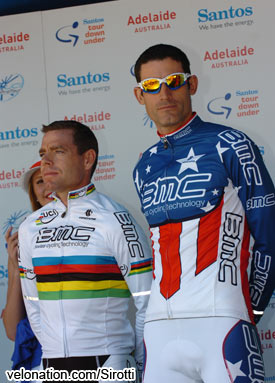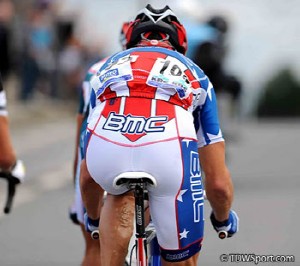American is deluxe helper for Evans in Tour de France
 The goal for BMC is clear, with the whole team centered around its captain Cadel Evans for the Tour de France victory. One of the team’s key players is George Hincapie, who helped Lance Armstrong to win seven Tours de France. Hincapie’s experience will come in handy both in the first week, where the Classics specialist will be pivotal to find the best way over the cobbles, as well as in the mountains. Besides his helper duties for Armstrong, Hincapie can also point to a win in the high mountains, stage 15 of the 2005 Tour de France.
The goal for BMC is clear, with the whole team centered around its captain Cadel Evans for the Tour de France victory. One of the team’s key players is George Hincapie, who helped Lance Armstrong to win seven Tours de France. Hincapie’s experience will come in handy both in the first week, where the Classics specialist will be pivotal to find the best way over the cobbles, as well as in the mountains. Besides his helper duties for Armstrong, Hincapie can also point to a win in the high mountains, stage 15 of the 2005 Tour de France.
Especially his Paris-Roubaix experience, where he was second in 2005, will be extremely important. “It is a fine art to know where to position yourself in the peloton and where the leader of the team needs to be,” Hincapie says. “When you do an effort on the side of the road even though they [teammates] are on your wheel, you need to be as smooth as possible. You always have to think about the person behind you, not who is in front of you.”
Hincapie has that capability and it is no wonder that he is the only rider who was on the side of Armstrong for all of the Texan’s seven victories. Trust and faith are important trades for a domestique and even though he rides for a different team and a different captain, his commitment stays 100 percent.
All for Cadel in Le Tour
“I am looking forward to the 2010 Tour and help to get Cadel to the top step of the podium. That is out biggest goal.” He will have the responsibility to steer Evans, who is a stranger to the real cobbles, safely through the first week. “It’s going to be very stressful stages, but I think we have one of the best teams in the peloton for that.”
He admits that there is some luck involved to get through without crashes, but BMC will do what they can to come out ahead. “We can definitely put some time on our rivals if things go well,” Hincapie says.
As a fan, Hincapie is in full support of the racing through the Belgian and Dutch country sides. “Cobbles are a part of the history of the sport and it makes it exciting. I guarantee you that there will be hundreds of thousands of people out there on the side of the roads; people all over the world will be glued to the TV to see what happens. In that respect I think it is a good thing, but maybe not for the riders.”
 Hincapie wasn’t sure where his ease with the small and bad roads are coming from. “Maybe by growing up in New York City and dodging taxis?” he asks with a smile. “I always felt comfortable and when everybody is fighting for position on a road the size of a bike path I usually find my way to the front.”
Hincapie wasn’t sure where his ease with the small and bad roads are coming from. “Maybe by growing up in New York City and dodging taxis?” he asks with a smile. “I always felt comfortable and when everybody is fighting for position on a road the size of a bike path I usually find my way to the front.”
He also knows what it means to protect his captain from the wind, pace him back after mechanicals or fetch water bottles. “I have gotten used to doing the job, even on my bad days I can still be one of the best teammates in the world.” But Hincapie has build up a nice resume himself. “On my good days I can still win a race of my own.”
Gent-Wevelgem (2001) or Kuurne-Brussel-Kuurne (2005) come to mind, as well as the overall of De Panne (2004) or the San Francisco Grand Prix (2001). He has also won the US National Championships more than once.
Hincapie likes to be part of good, well set-up teams, where he can excel. “I always take good care of myself nutritionally, I train hard and I am never complacent in my training.” The rider who just turned 37 knows that he has to make up for his age. “You can never let your guards down cause there is always young guys coming up and getting stronger and stronger.” So far he keeps them in check and he listens to his body when he trains.
His motivation comes from the love of the sport. “I like the fact that companies like BMC and [people like] Andy [Rihs] come in. People who show their passion for the sport and want it to continue to grow and become globalized.” It is something that Hincapie dreamed of doing even when he was a kid. “I have never taken my position for granted.”
Should the inevitable stop to racing come one day. Hincapie would be happy to stay involved in the sport. “I hope that even long after I stop racing I can be part of the growth of cycling and making it a globalized sport.”